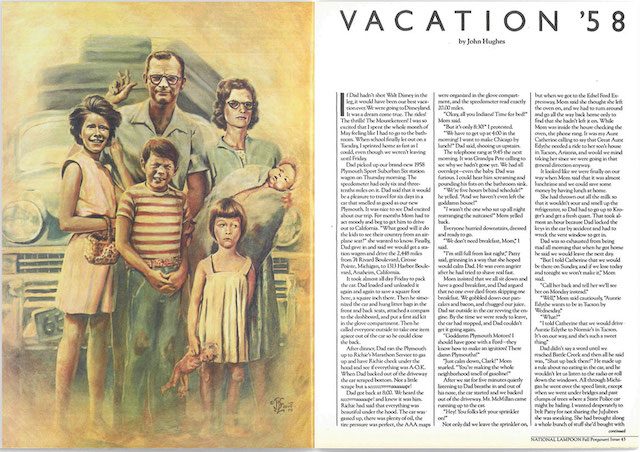
The producers of a 2006 disaster called “National Lampoon’s Pledge This!” are suing the film’s star, Paris Hilton, for failing to do her part in promoting the movie when it was released. It seems to me that not telling anyone she’s in a movie IS the best way for Paris Hilton to promote it, but the filmmakers disagree.
Imagine the indignity in this. First you’re foolish enough to cast Paris Hilton as the star of your comedy. Then your movie goes straight to DVD*, and nobody wants to see it there, either. Finally, at a loss, you have to declare publicly that if Paris Hilton had made more talk-show appearances and given more magazine interviews, your film would have done better. You must basically announce to the world that your livelihood depends on Paris Hilton.
All of this is especially sad because it’s a reminder that the “National Lampoon” label, once a symbol of quality, is now as rancid and off-putting as Paris Hilton’s cold sores. It used to mean a movie was probably good, or at least OK. Now it always — ALWAYS — means the movie is terrible. How did this happen?
To explain it, we have to go back to the dark, medieval era known as the 1960s. At the end of that decade, some Harvard graduates who had worked on the university’s quarterly humor magazine, Harvard Lampoon, wanted to start a national version of it — hence, National Lampoon. For this privilege they paid Harvard Lampoon a licensing fee, and the first issue of the national publication came out in early 1970.
National Lampoon quickly became very popular. The magazine exhibited a reckless disregard for fairness, good taste, and politeness. It ruthlessly mocked anything its writers considered phony, which apparently included pretty much everything. It was like a more R-rated (or even X-rated) version of MAD magazine.
The success of the magazine led to a radio show, a stage show, and record albums, all featuring sketches written by staff members and performed by budding young comics like Chevy Chase, Gilda Radner, and John Belushi. “Saturday Night Live,” launched in 1975, liberally plundered the National Lampoon Rolodex for writers and performers. Movies were the next logical step, and “National Lampoon’s Animal House” — written by staffers and based on short stories that had appeared in the magazine — was a huge hit.
“National Lampoon Goes to the Movies” (1982) was a flop, but at least it fit the ethos of the magazine and had some connection to it. “National Lampoon’s Vacation” (1983) starred Lampoon buddy Chevy Chase and was based on a John Hughes story that had appeared in the magazine. It was also a huge box office success, leading to — for better or worse — the proliferation of movies with “National Lampoon” in the title.
National Lampoon eventually stopped getting involved in moviemaking altogether, and the magazine ceased publication in 1998. It had been bought in 1991 by a company called J2 Communications, which was only mildly interested in the magazine and sought instead to make money by selling the National Lampoon name. Thus, for a small fee, you could slap the words “National Lampoon” on any pile of trash you’d filmed and be guaranteed a little more notoriety because of it.
Now, of course, the name has become utterly devalued. You probably haven’t even heard of most of the direct-to-video comedies that have borne the “National Lampoon” label in the last few years, and the ones that have snuck into theaters — “Gold Diggers,” “Van Wilder: The Rise of Taj,” etc. — have been loathsome. The words “National Lampoon Presents” are a curse now, not a blessing. If I were Paris Hilton, I wouldn’t promote my appearance in one of these movies either. Of course, if I were Paris Hilton, I’d be making a lot of other changes, too.
*IMDb says it was released theatrically in Los Angeles on Dec. 1, 2006 — but I can’t find any external evidence that this actually occurred. For all intents and purposes, apart from a release in Russia and Ukraine (where it grossed around $1.5 million), the movie went straight to DVD.
— Film.com



